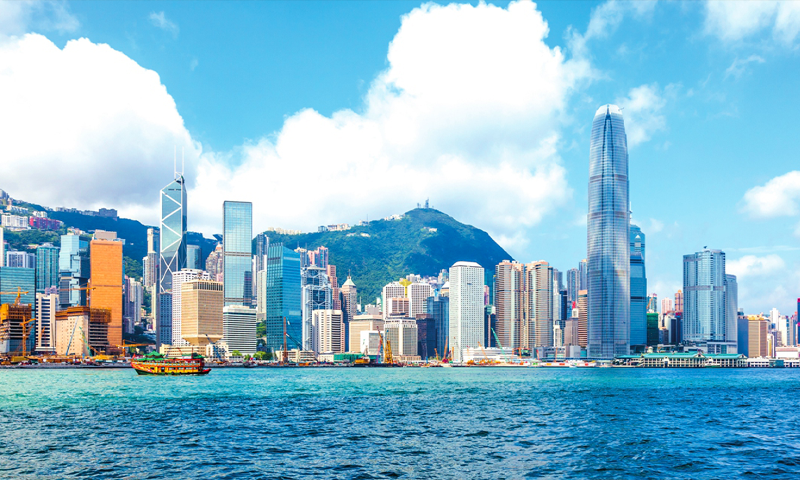(Source:Global Times,2025-04-08)

A view of Hong Kong File Photo: VCG
Chief Executive of the Hong Kong Special Administrative Region (HKSAR) John Lee Ka-chiu said on Tuesday that the US' imposition of tariffs is a ruthless behavior that damages global and multilateral trade, and the HKSAR will strengthen its strategy in seven areas, according to the HKSAR government's website.
Last week, the US announced the imposition of so-called reciprocal tariffs on trading partners around the world, including an additional 34 percent tariff on Hong Kong products. Together with the 20 percent tariff announced earlier, the total tariff imposed on Hong Kong products is up to 54 percent, Lee said.
The US no longer adheres to free trade, arbitrarily undermining the internationally established rules of world trade. Its ruthless behavior damages global and multilateral trade, Lee said at a media session ahead of an Executive Council meeting.
Lee stressed that the reckless imposition of tariff affects many countries and regions around the world with huge tax rate increases covering a wide range of goods, disrupting the world economic and trade order, and bringing great risks and uncertainties to the world.
In response, the HKSAR government will strengthen its strategy in seven areas, Lee said.
According to Lee, Hong Kong will seize national development opportunities and integrate itself into the national development framework. Lee said the city would also strengthen international exchanges and deepen regional ties by signing more free trade agreements with other economies.
We will continue to provide various forms of support to help Hong Kong enterprises cope with the impact of tariffs and external challenges, including capital flow assistance and export credit insurance, said Lee.
Additionally, the city will also step up accelerating industrial transformation, developing technological innovation and attracting top-tier talent, strengthening international financial cooperation to attract investments and capital, luring in more foreign companies and capital to the city, read the release on the HKSAR government's website.
According to Lee, Hong Kong's attractiveness to global capital lies in the security and stability that the city can provide to investors and enterprises under One Country, Two Systems.
Lee said that the city will enhance trade collaboration with other regions to mitigate the impact of US tariffs, according to a report by Hong Kong-based TVB.
HKSAR's Financial Secretary Paul Chan Mo-po on Monday also denounced Washington's tariff moves as bullying and unreasonable and a violation of WTO rules, according to remarks posted on HKSAR's official website.
The US announced last week that it would impose so-called reciprocal tariffs on nearly all its trading partners, a bullying and unreasonable practice that violates the rules of the WTO, deeply undermining the multilateral trading system, which is the cornerstone of international trade, disrupting global supply chains, and severely impacting the global economic recovery process, said Chan at a press conference.
The international community and investment markets oppose the US approach, which uses the name of reciprocal tariffs to exercise hegemony in reality, causing harm to global development at different levels, Chan said.
Chan noted that at the economic level, the market estimates that the US economy may fall into recession, and the global economy will also be dragged down. At the corporate level, supply chains are severely disrupted, and many companies that export to the US will be hard hit. At the consumer level, US consumers are the first to bear the brunt of this, the HKSAR financial chief said.
The unwarranted high US tariffs are completely divorced from the current global economic and trade order, having caused a major impact on global economic exchanges, trade and investment relations, Jian Junbo, a deputy director of the Center for China-Europe Relations at Fudan University's Institute of International Studies, told the Global Times on Tuesday.
Jian suggested that the US tariffs may have significantly reconfigured global supply chains, which will inevitably alter current trade patterns, economic order and investment efficiency.
Global capital markets, including those in the US, tumbled on Monday, a clear message of disapproval regarding the US administration's tariff policies, Zhou Mi, a senior research fellow at the Chinese Academy of International Trade and Economic Cooperation, told the Global Times on Tuesday.
Beyond financial markets, US consumers, who ultimately bear the cost of these tariffs, may choose to delay purchases, but such deferrals have their limits, said Zhou.






